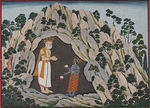Table of Contents
Part One: The Adventure of the Hero

Chapter 3: Return
1. Refusal of the Return
After the hero completes his quest, he must still return with his life-changing boon. The usual course of events sees the hero sharing his wisdom with his community, or the world. But this responsibility has often be refused. Campbell cites the Buddha as an example. After his victory, the Buddha was unsure of whether his message could be communicated. And there are many stories of saints and heroes who remain in their eternal state of ecstasy without returning.
There is an ancient Hindu warrior tale of King Muchukunda. After securing victory for the gods who were suffering defeat, Muchukunda was given the opportunity (by the gods) to get anything he wanted. Tired after battle, his only wish was to fall into an eternal sleep, and whoever bothered him would be burned to ashes after Muchukunda sees them. His was granted.
Krishna, a youth who was the incarnation of the Lord of the World, Vishna, assumed the throne, and brought a utopian period of peace to his people. Suddenly, a group of barbarians invaded his kingdom. Being divine, Krishna decided to emerge victorious playfully through using a simple ruse. He appeared before his enemy unarmed and enticed him to follow him into a cave, where King Muchukunda was asleep.
“Oh!” The barbarian thought. “So he has lured me here and now feigns to be a harmless sleeper.”
He kicked the figure sleeping on the ground, and woke Muchukunda – who had been asleep for a very long time. The King’s eyes slowly opened, and his first glance burned the enemy king into a heap of hash. Muchukunda turned his face, and saw Krishna inside the cave. Instantly, Muchukunda recognized the radiance of the youthful Krishna and knew he was an incarnation of God. Muchukunda bowed before him with a prayer:
“My Lord God! When I lived and wrought as a man, I lived and wrought—straying restlessly; through many lives, birth after birth, I sought and suffered, nowhere knowing cease or rest. Distress I mistook for joy. Mirages appearing over the desert I mistook for refreshing waters. Delights I grasped, and what I obtained was misery. Kingly power and earthly possession, riches and might, friends and sons, wife and followers, everything that lures the senses: I wanted them all, because I believed that these would bring me beatitude. But the moment anything was mine it changed its nature, and became as a burning fire.”
“Then I found my way into the company of the gods, and they welcomed me as a companion. But where, still, surcease? Where rest? The creatures of this world, gods included, all are tricked, my Lord God, by your playful ruses; that is why they continue in their futile round of birth, life agony, old age, and death. Between lives, they confront the lord of the dead and are forced to endure hells of every degree of pitiless pain. And it all comes from you!”
“My Lord God, deluded by your playful ruses, I too was a prey of the world, wandering in a labyrinth of error, netted in the meshes of ego-consciousness. Now, therefore, I take refuge in your Presence—the boundless, the adorable—desiring only freedom from it all.”
As Muchukunda left his cave, he found himself to be a giant among men. He decided to leave again, and retreated to the mountains where he dedicated his energy to ascetic actions that would ultimately free him from his final attachment to the forms of being. Muchukunda chose to refused the return again. Could he be blamed?
If you are interested in reading books about unmasking human nature, consider reading The Dichotomy of the Self, a book that explores the great psychoanalytic and philosophical ideas of our time, and what they can reveal to us about the nature of the self.